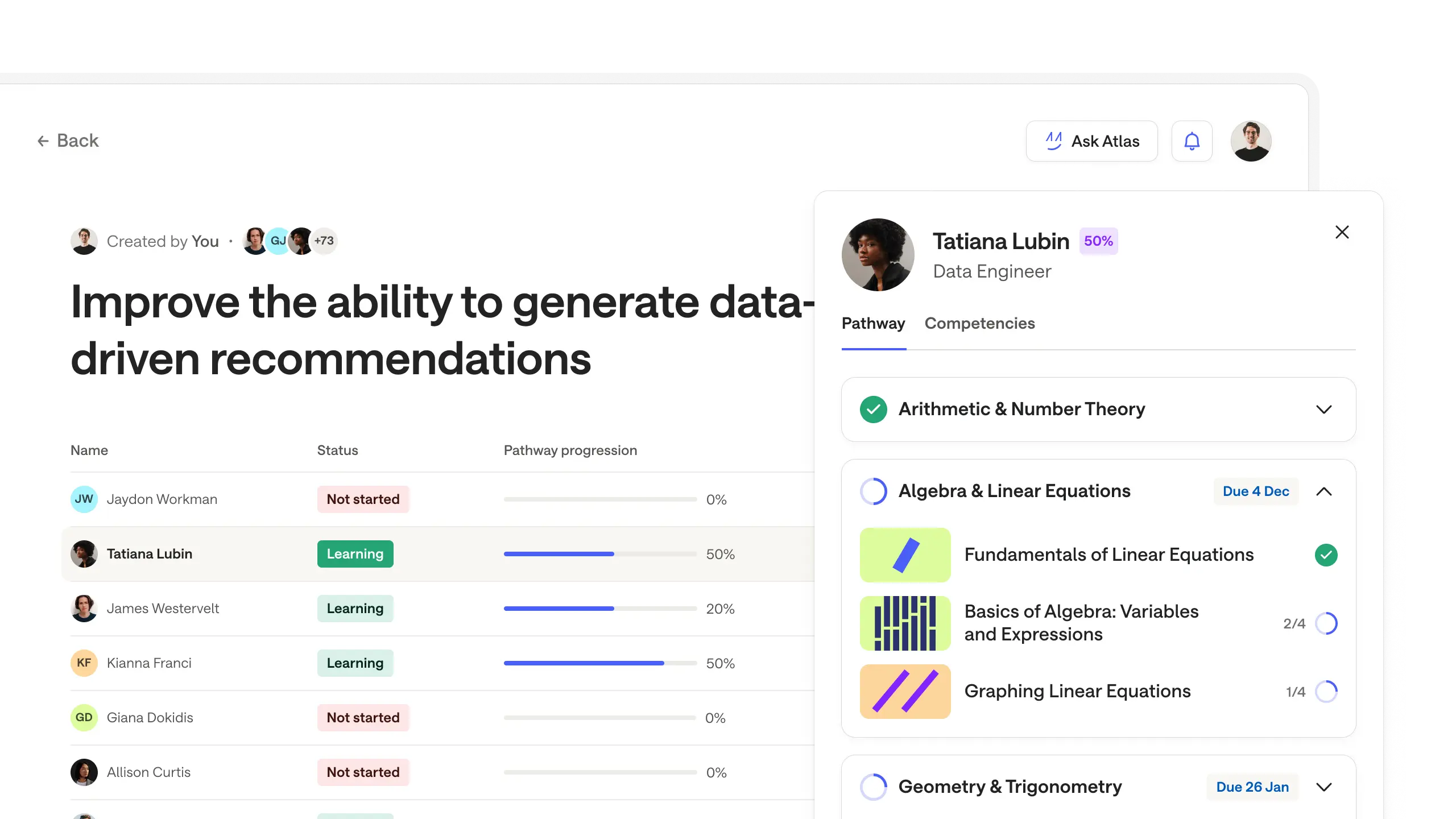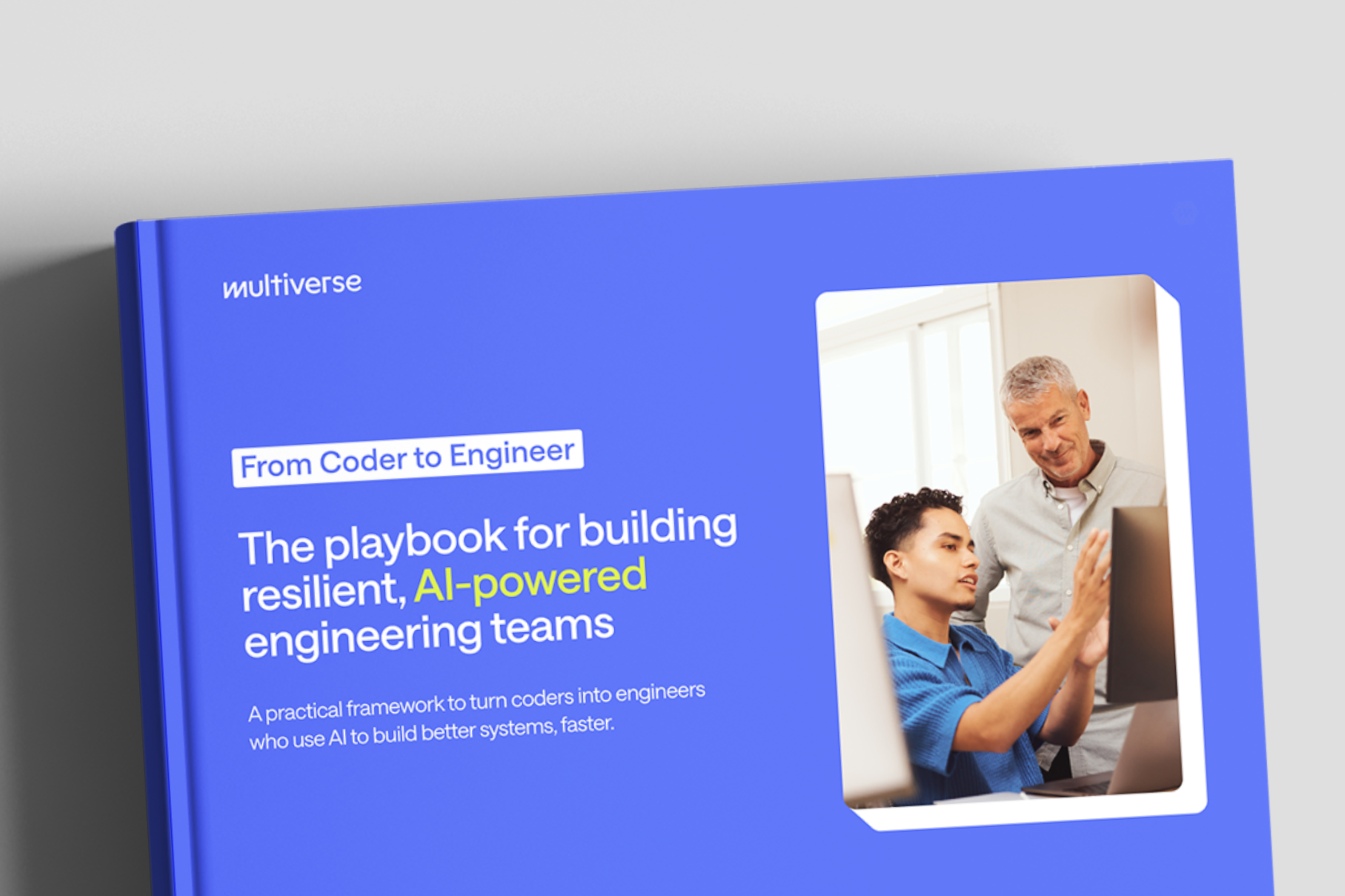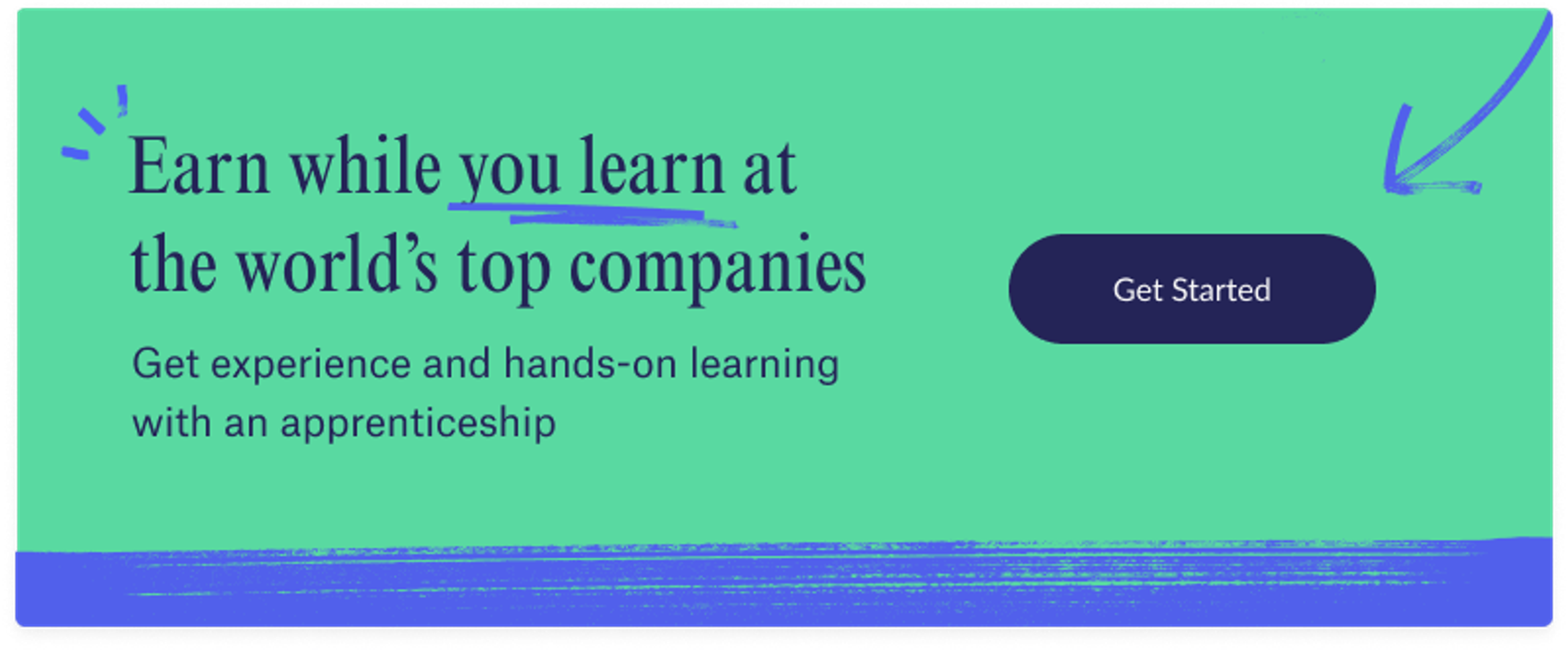Contents
If you’re considering a role in development or engineering, you’ve likely asked yourself: ‘Software Developer vs Software Engineer — is there a difference?’ And for good reason.
As we speak, over 11,00 permanent jobs(opens new window) are available in the UK that require software engineering skills. These include Agile software development, full-stack development and understanding coding languages. But these engineering skills are also relevant to those pursuing a career in software development.
Here’s the thing: That skill crossover is just the tip of the iceberg. That’s why we’ve put together this blog to help you explore the distinctions and similarities between the two roles.
Below, we’ll cover:
- Defining the roles
- Key responsibilities and projects
- Educational paths and qualifications
- Skills and tools comparison
- Career progression and opportunities
- Salary and job outlook
- Case study: a real-world example
- Choosing the right path for you
- The future of software roles
- Resources for further exploration
- Conclusion: embracing a career in software
Engineer Vs. Developer: Defining the Roles
In general, Software Developers build software applications or systems based on designs created by Engineers. They usually focus on one part of the software development lifecycle (SDLC) rather than the entire SDLC. The SDLC includes the major stages and tasks that take a software application or system from start (planning) to finish (deployment and maintenance).
That said, there are crossovers between the roles of Software Engineers and Software Developers. Many professionals with a ‘Software Developer’ title will design, create, test and maintain software applications or systems. Those tasks combined are closer to the traditional role of a Software Engineer.
On the other hand, Software Engineers design, build, test and deploy full-stack applications. So, rather than developing a specific software or computer system, these professionals typically have a broader focus on the entire SDLC. Tasks outside the development stage often include project management and continuous improvement. That’s as opposed to software development in isolation.
Software Engineers might also engage in more complex problem-solving and system architecture tasks than Software Developers. In either case, both Developers and Engineers aim to help create software that meets specific requirements and addresses user needs.
Key Responsibilities and Projects
Software Developers and Engineers may work on similar projects, such as mobile apps, cybersecurity, data engineering or video games. Other projects for either role can include front-end and back-end development.
Although Software Developers and engineers may work on similar project types, the scale and scope of their work usually differ. A Software Developer may plan the structure and functionality of software applications based on client or user requirements. Meanwhile, a Software Engineer designs the overall architecture. The latter includes defining the structure of components, their interactions, and how data flows through the system.
Another key difference in scope and complexity is creating custom-built tools for the project. Software Engineers may need to build tools to develop a software product, whereas Software Developers usually use pre-built tools.
There may also be differences when it comes to writing code. Both Software Developers and Engineers write code to execute software solutions. But Software Developers typically use programming languages to implement the designed software. In contrast, Software Engineers will need to focus on not just code quality but also maintainability and scalability across the project. Software Engineers might also work on a system's more complex or critical components.
The level of team collaboration is typically different, too. The nature of a developer’s work means they tend to work more with ‘things’ (i.e. systems and applications) than people. That doesn’t mean there isn’t any team collaboration, but they will generally work more independently than engineers.
On the other hand, an engineer’s work generally requires more collaboration. So they might work with developers, other engineers and people from different teams. A Software Engineer might also collaborate with people who use the software to help them improve it.
Educational Paths and Qualifications
You can become a Software Developer through a variety of educational pathways. One option is to earn a relevant A Level or a Level 3 Certificate in a subject like computing. Some developers also attend university, although a university degree isn’t always necessary for software roles. Other Software Developers are self-taught through personal projects or coding boot camps.
Many professionals also enter software development through a tech apprenticeship. To be eligible, you’ll usually need at least a grade of 4/C GCSE (or equivalent) in Maths and English. Relevant A-level qualifications can also benefit your application.
Like Developers, Software Engineers can come from a range of educational backgrounds. Some might have a Bachelor’s Degree in Mathematics, Computer Science or Engineering. But as with Developers, a university degree isn’t necessary, or even the best route, to becoming a Software Engineer.
Many Engineers start out as Software Developers and upskill or are self-taught and transition into engineering through a software engineering apprenticeship. Through their apprenticeship, they gain hands-on work experience and an accredited certification. In the case of a Software Engineering Level 4 apprenticeship standard, it’s the equivalent of the first year of an undergraduate degree.
Skills and Tools Comparison
Software Developers and Software Engineers both need technical skills to do their jobs. They’ll both know different programming languages, such as JavaScript, SQL, Python, and CSS. But a Software Engineer will typically have a more in-depth understanding of the same programming languages and access to a broader range of languages.
Software Developers and engineers both need to understand algorithms and data structures. That said, a Software Engineer must also design, implement and optimise algorithms to solve specific problems efficiently. A Software Developer, on the other hand, will usually work with pre-existing algorithms to complete tasks.
When it comes to soft skills, both professionals need communication skills. However, because Software Engineers collaborate with people outside of their teams, they will need to communicate technical concepts to non-technical people. They will also both need problem-solving skills.
There are a range of software development methodologies that both developers and engineers use, including:
- Agile development methodology: Software is developed in iterations to reduce risk.
- DevOps deployment methodology: This isn’t just a methodology. It creates organisational change to encourage collaboration between the departments involved in the development lifecycle.
- Waterfall development method: A linear model you complete in sequential phases. Each phase has a fixed goal.
- Rapid application development (RAD): The development process is condensed so that investment costs are lower and production is quicker without reducing quality.
There’s also a crossover between the tools commonly used by both Developers and Engineers. Both professionals use different tools for bug tracking, development, code review and version control. GitHub, Jira, Codenvy and Adobe Dreamweaver CC are common examples of tools that both Developers and Engineers use.
Career Progression and Opportunities
There are a few different career progression routes for Software Developers. A linear pathway might involve progressing from Junior to Senior Software Developer and then Software Development Manager. But you can also choose to progress into a different specialism, such as web development, front-end development, or back-end development.
Like Developers, Software Engineers might follow a junior-to-senior linear progression route. They might also progress further from Software Engineering Manager to Head of Department. Similarly, engineers can progress to a specialism. That could be a specialist role like Cyber Security Engineer, Data Engineer, or Systems Engineer.
There’s also potential to crossover between software development and engineering roles. For Software Developers hoping to transition into engineers, that will likely mean upskilling. That’s because there are usually extra responsibilities (like specifications, architecture and project management) that you might not have done as a developer.
Salary and Job Outlook
According to Glassdoor, the average Software Developer salary in the UK is around £43,000. Entry-level roles can range from £25,000 to £58,500 a year, and senior Software Developers' average salaries range from £45,000 to £70,000.
The average Software Engineer salary in the UK is around £48,000, according to Indeed. But what you can earn in this field depends on a few things, including experience level, skills, location and your role. Let’s take a look at how experience level impacts your salary range as an example:
- Entry-level salary: £29,000-£45,000
- Average base salary: £48,000
- Top-paying salary: £195,000
Data sources: Indeed, Talent and Levels.fyi.
A quick search for “Software Developer” jobs on LinkedIn shows around 19,000 UK job openings advertised on the platform. A search for “Software Engineer” brings up a similar volume of job vacancies.
Data from ItJobsWatch finds over 11,000 permanent UK jobs requiring software engineering skills. As there will be some crossover in the skill demands between engineering and development, those jobs might be relevant to both professions. In general, there’s a higher demand for Software Engineers and Developers who understand Agile software development and programming languages like Java and Python.
Case study: a real-world example
Last summer, we shared stories from our industry-leading team members who transitioned from big tech to Multiverse. Our Director of Engineering, Joe Freeman(opens new window), started with us after working at industry giants like Amazon and Deliveroo. Freeman has excelled in both software development and software engineering-specific roles. We asked him about his day-to-day work as Director of Engineering.
“Being a builder at Multiverse means solving problems in a product centric way, to help scale our mission. Our problem spaces straddle multiple user types — our apprentices, our enterprise customers and our coaches. We solve problems that consider the interactions between these actors which makes for exciting systems thinking and opportunity for experimentation.”
Joe adds, “We are solving unique problems in a relatively new industry and we want to become the best version of Multiverse - we don’t want to replicate how other companies work. Being able to not only challenge the status quo, but change it, is an important part of being successful here and there are no areas out of bounds. Everything from our process, our development frameworks, tools and technologies are open to challenge and improvement — if it’s not working as well as it could, you can change it!”
Joe explains that Multiverse and the engineering team are relatively early in “our journey building.” That means the technology team often has the opportunity to work on solving novel problems. Even though this can be a challenging role because Multiverse sits within a newer industry with novel problems to solve, the challenge is worth it.
According to Joe, the work is “both exciting and impactful.” To top it off, “When we are successful we make a real difference for our apprentices and provide real impact for our customers.”
Choosing the Right Path for You
Software Developers and Software Engineers are similar but not always the same. Whether a developer or an engineer, the scope of the role itself will largely depend on the employer. In smaller organisations, the roles are pretty interchangeable. But in larger ones, you’re typically either a Software Developer or a Software Engineer, with the distinct roles co-existing in the same team.
Still, the skills and responsibilities of the two roles will often overlap. That said, when choosing between either specialism, it’s worth considering your interests, strengths and career goals.
Software development might be best for you if you prefer to work with ‘things’ rather than people. On the other hand, software engineering is a better option if you like to collaborate and communicate with technical and non-specialists.
If you’d like to niche down into one area or discipline, development likely offers more specialist career pathways. Meanwhile, engineering could be for you if you’re interested in following a linear career pathway that leads to people or project management.
The Future of Software Roles
69% of UK and US business leaders agree that the emergence of Artificial Intelligence (AI) will create more demand for AI skills in the workforce. Further, the U.K.’s Department for Education finds that 10-30% of jobs could realistically be automated(opens new window) with AI.
It makes sense then that AI, Machine Learning and automation will likely impact the roles of Software Developers and Engineers in the future. That could mean using AI to automate coding tasks or to gather large amounts of data. Meanwhile, machine learning is pivotal in fraud prevention for software professionals specialising in cyber security.
Aside from AI and Machine Learning skills, a Red Hat survey(opens new window) found that 69% of IT managers need staff with cybersecurity skills. Further in-demand skills for software professionals include cloud computing (68%) and full-stack development (63%).
Resources for Further Exploration
If you’re interested in exploring careers in software development or engineering further, consider the Multiverse blog. In addition to general career information, you’ll also find articles on specific skills highly relevant to software roles, such as the differences between Java and JavaScript.
Online publications like TechRepublic and techUK.org are a great starting point for staying ahead of emerging tech trends that could impact software roles. You might also consider exploring professional organisations in the UK. The Institution of Analysts and Programmers (opens new window)(IAP) and the Business Application Software Developers Association(opens new window) (BASDA) are two examples.
If you want to take short online courses, these can help you develop entry-level software development and engineering skills. You can then add these to the skills and tools section of your CV. For career starters or switchers, an updated and specialised CV can help you land an entry-level software role.
Launch your Career in Software
Ask one software professional, and they'll tell you there’s little-to-no difference between Software Developers and Software Engineers. Ask another, and they’ll tell you there will always be a crossover, but they are distinct roles. Long story short? The biggest determinant of the differences and similarities in either software role is typically your employer.
Even if you apply for roles in a smaller organisation where the positions are similar, if not the same, it’s still worth knowing the distinctions and overlaps. This understanding will give you a clearer idea of which pathway best aligns with your skills, personal attributes and career aspirations.
To start or advance your software career, complete our fast and straightforward application(opens new window). If you’re eligible, our team can guide you through the software pathways and progression routes.










